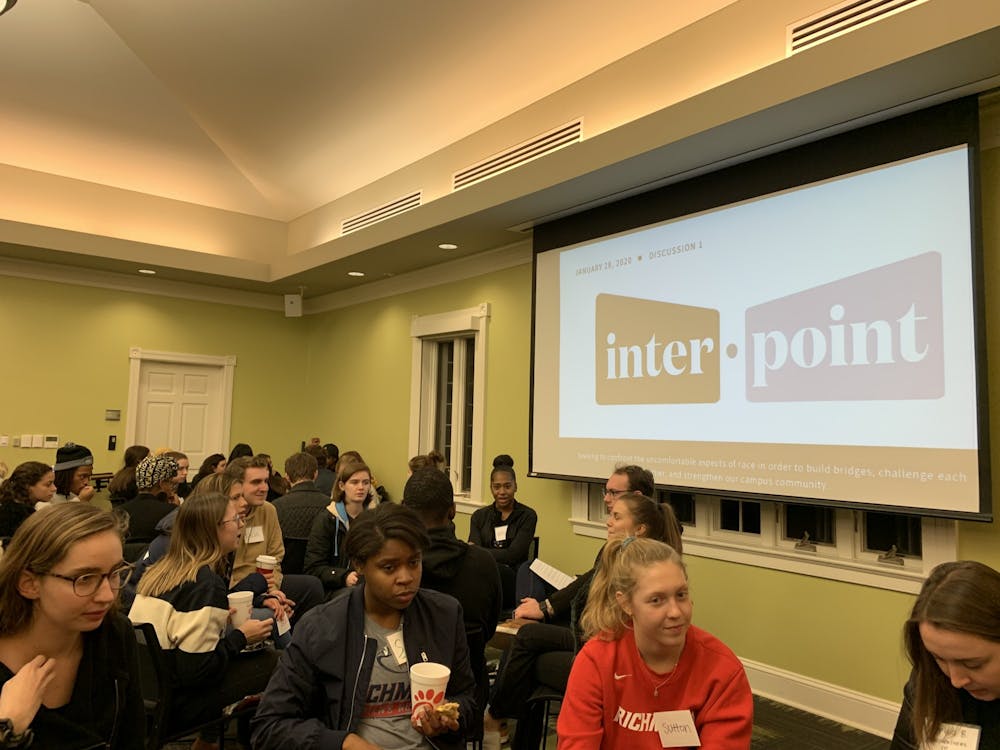More than 200 people attended the first of a three-part discussion series titled Interpoint to discuss race not only at the University of Richmond, but in people’s lives as a whole.
Upon entering the Web on Tuesday night, every participant was asked how they identify so that they could be placed in an assigned group. This process was meant to foster conversation with people outside of one's comfort zone, said creator Lauren Stenson, a sophomore student.
“The idea of Interpoint was to have a safe space for people to come together who don’t normally talk to each other — that’s why we intentionally split people up — we intentionally had seating charts asking people how they identify so that we could split them up and have them actually hear people different from them ethnicity-wise, racially-wise, or nationality-wise,” she said.
Lauren Stenson started the program with sophomore Emma Johnson more than a year and a half ago when they realized that UR needed to have interracial dialogue on campus, Stenson said.
The preparation for the series did not come without its doubts.
“I got a lot of fears [from people] that we weren’t ready as a community, as a university, to have this conversation,” Stenson said in her opening speech for the discussion. “So I have faith in everyone in here that we can have this conversation, so I hope that everyone can be open-minded and honest and vulnerable.”
The 10 leaders of these discussions -- known as facilitators -- were trained this past Sunday at the Virginia Center for Inclusive Communities, said Lisa Miles, associate director of the Office of Common Ground.
Because the turnout was larger than anticipated, the program had more than 22 seating groups but only 10 facilitators. Since there was such an influx of people, the facilitators floated from group to group while Stenson led the discussion from the back of the room.
Some of the racist events that have transpired over the past week might have contributed to the turnout for the event, Miles said.
“You never want to see things like that happen, but sometimes there are outcomes that you can see positively and it activates people to participate,” she said.
UR students came into the discussion wanting to have these conversations about race.
“I mean personally for me I’ve seen that students on campus tend to stray away from having difficult conversations, specifically about race,” sophomore Julian Starks said. "With everything that’s going on, I feel that it’s more important than ever to discuss it right now in this moment.”
Enjoy what you're reading?
Signup for our newsletter
Sophomore Shira Greer also felt that race is a difficult conversation topic.
“I came because I know some of the facilitators," Greer said, "and at first I was on the fence about coming because I think race can be something that’s hard to discuss, especially when you’re in scenarios where you’re not exactly sure who the other people at the table are going to be.”
Stenson explained during the event that there are some ground rules that need to be followed such as being open to listening to what others have to say and avoiding judgment.
“Apperception is a term that means that everyone has a cultural lens that they have because of their experiences in life,” Stenson said. “That cultural lens limits you to understanding other people from other backgrounds.”
First-year Hoor Ul Ain, a Westhampton College Government Association senator, finally felt as though she was accepted in a space on campus without changing anything about herself.
“Today, this event was super important for me because I’m wearing all black,” she said. “I’m wearing ethnic clothes and I’m here, occupying space with so many people from our campus community, and I don’t feel like I have to change anything about myself.
"I don’t have to pretend I’m not from Pakistan or that I’m not a Muslim.”
The questions for the night encouraged people to talk about when they first noticed race and when they realized it meant something in society.
First-year Rosa Lobo felt that the conversations she had were successful.
“I felt like coming here was a good way for me to educate myself so that way I can further provide that to my community myself,” she said.
Senior Justina Choo also felt like the night was productive by creating a space where people can ask questions.
“I think it’s really encouraging that people are here even when they look uncomfortable because I think minorities really do support people who want to be a part of it [the conversation], even if they’re uncomfortable, and we want them to know that it’s okay to be uncomfortable,” she said.
The racist epithets that were found last week definitely played into the turnout of this event, Stenson said.
"This weekend happened and I think it opened a lot of people’s eyes to the fact that we have a problem and that it’s not just microaggressions, it’s not just miscommunications, but it’s actual racism on campus," Stenson said. "But the people that were here today can do something about that and can change the culture."
The second Interpoint discussion will be held on Tuesday, March 3 from 7-8:30 p.m.
Students interested in becoming a facilitator can contact interpoint.ur@gmail.com.
Contact managing editor Lindsay Emery at lindsay.emery@richmond.edu.
Support independent student media
You can make a tax-deductible donation by clicking the button below, which takes you to our secure PayPal account. The page is set up to receive contributions in whatever amount you designate. We look forward to using the money we raise to further our mission of providing honest and accurate information to students, faculty, staff, alumni and others in the general public.
Donate Now



